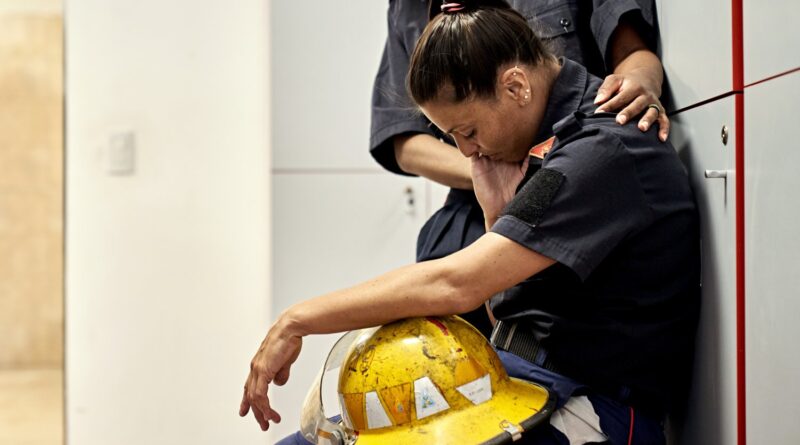A new strategy for coping with stress
Some people, especially those in the public service, do wonderful things: Think of the health workers fighting to keep patients alive or the first responders at the scene of a car accident. But emotional weight can become a burden on the mind. Research has shown that emergency workers are at greater risk of mental health problems such as post-traumatic stress disorder. How can people face such stressful experiences and live well?
A new study from the McGovern Institute for Brain Research at MIT has revealed that a psychological strategy focused on social well-being can work to help people cope with stressful events. The research team found that this method was comparable to another well-established emotion regulation strategy, opening up a new tool for dealing with extreme situations.
«How you think can improve how you feel,» says John Gabrieli, the Grover Hermann Professor of Health Sciences and Technology and professor of brain and cognitive science at MIT, who is the paper’s lead author. «This research suggests that a positive social approach can be very beneficial in improving the health of people who experience chronic traumatic events.»
The study, published today on PLOS ONE, is the first to evaluate the effectiveness of this insight strategy. Nancy Tsai, a postdoc in Gabrieli’s lab at the McGovern Institute, is the paper’s lead author.
Emotion control tools
Emotion regulation is the ability to mentally change the way we feel – an important skill for maintaining mental health. Doing so can make a person feel better about dealing with negative events, and emotion regulation has been shown to enhance emotional, social, psychological, and physical outcomes across the lifespan.
One emotion regulation strategy is «distraction,» in which a person deals with a negative event by imagining it happening far away, in the past, or from a third-person perspective. Distance is well-documented as an effective cognitive tool, but it may not work well in certain situations, especially socially charged ones – like a firefighter saving a family from a burning house. Instead of withdrawing, instead, one can be forced to deal directly with the situation.
«In these situations, ‘social good manners’ can be a powerful alternative,» Tsai says. more danger.” For example, firefighters with depression may focus on the fact that their job enables them to save lives.This idea had to be supported by scientific research, therefore Tsai and his team, along with Gabrieli, saw an opportunity to test this strategy.
A new lesson
MIT researchers recruited a group of adults and had them fill out a questionnaire to collect information including demographics, personality traits, current health, as well as how they manage their emotions and deal with stress. The group was randomly divided into two groups: the remote group and the social good group. In the online study, each group was shown a series of images that were either neutral (such as fruit) or had very negative content (such as physical injuries). Participants were fully informed about the types of images they could see and could withdraw from the study at any time.
Each group was asked to use their given cognitive strategy to respond to half of the negative images. For example, while looking at a distressing image, a person in the far group would have thought it was a scene from a movie. On the other hand, a person who belonged to the social good group may have responded to the image by thinking that they were first responders saving people from danger. For the other half of the negative pictures, the participants were asked to simply look and pay attention to their feelings. The researchers asked the participants how they felt after each picture was shown.
Public good as a strong policy
The MIT team found that good social distancing practices helped reduce negative emotions. Participants reported feeling better when they used these techniques after watching negative news compared to when they did not, and they said that both techniques were easier to use. .
The results also revealed that, in general, distance produced a strong effect. Importantly, however, Tsai and Gabrieli believe that this research provides strong evidence for social welfare as a powerful tool for situations in which people cannot be separated from themselves, such as rescuing someone from the danger of car, «Which is something that can happen in real people. world,» says Tsai. In addition, the team found that people who were successful in using positive social behavior were more likely to view stress Tsai says this link may point to the cognitive processes that drive emotion regulation and how people respond to stress.
In addition, studies have shown that older people use thinking techniques more effectively than older people. The team suspects that it may be because, as previous studies have shown, older people know how to control their emotions, perhaps due to having more experiences in life. The authors note that successful emotion regulation also requires cognitive flexibility, or having a flexible mindset to adapt well to different situations.
Gabrieli says: «This does not mean that people, such as doctors, should change their attitudes to the point where they completely remove themselves from bad situations. «But our study shows that positive social behavior can be a powerful strategy for combating the high emotional demands of certain tasks.»
The MIT team says future studies are needed to further validate this work, and that such research holds promise for discovering new cognitive tools to equip individuals to take care of themselves while taking on a challenge. of caring for others with courage.
#strategy #coping #stress
